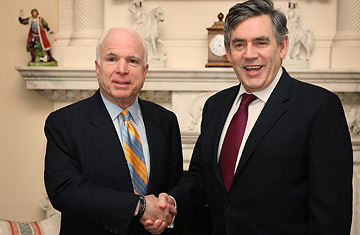
UK Prime Minister Gordon Brown meets with Republican presidential hopeful Senator John McCain.
Some of Britain's most distinguished journalists genuflected to John McCain as he emerged from his first meeting with Gordon Brown on Thursday morning. Observers later reported that the meeting had been a workmanlike affair, 45 minutes long and short on chitchat. Both politicians appeared keen to cut straight to the burning issues of the day: Iraq (a polite disagreement over Britain's plans to scale down its troop deployment), Afghanistan (praise for Britain's role and concern over the challenges), climate change (a bad thing), Tibet ("very disturbing," said McCain afterwards). For Brown, it was an opportunity to get the measure of a man who could conceivably move into the White House at the beginning of next year. For McCain, it was a chance to burnish his foreign affairs credentials, not least after tarnishing them at a press conference in Jordan two days earlier where he suggested that Shi'ite Iran was giving succor to Sunni al-Qaeda.
On that occasion the independent Connecticut Senator Joe Lieberman, traveling with McCain as part of a congressional delegation, was quick to intervene. "I'm sorry; the Iranians are training the extremists, not al-Qaeda," said McCain, after Lieberman whispered a correction. In Downing Street, Lieberman also flanked the veteran Senator, along with another member of the Senate Armed Forces Committee, Lindsey Graham, a Republican senator from South Carolina. Lieberman and Graham said little — and what they did say was in praise of their "plain-speaking" companion McCain — but they enunciated their few words clearly. McCain's voice, by contrast, proved too soft to withstand the gusts of a blustery London day. Journalists who normally hover behind the banks of TV cameras and photographers during press conferences held on the private street outside 10 Downing Street could not hear his answers and were forced to maneuver crablike below the massed lenses to kneel at the senator's feet.
They may have looked like supplicants but their questions were not conciliatory. The BBC's political editor Nick Robinson asked McCain to clarify for British audiences whether he deserved his "McSame" nickname which implies a McCain administration would be little different from the Bush-led government. The senator skirted a direct answer but later criticized the postwar handling of Iraq. "The problem with Iraq, in my view, is because it was mishandled after the initial success," he said. "That caused great sacrifice, frustration and sorrow."
Asked about his Jordan gaffe, the senator laughed without evident humor. "We all misspeak from time to time and I immediately corrected it," he replied. "Just as Senator Obama said he was looking forward to meeting the president of Canada, we all misspeak from time to time. So we'll just move on."
He clearly didn't want to detour into voicing the kind of open criticism of Brown's Iraq policy he has expressed in recent interviews. ( "Obviously I would like to have seen [British troops] stay longer and larger. At the time, I didn't think it was a good idea, but I understood the domestic British political situation," McCain told the Daily Telegraph in February about British plans for a drawdown in Basra.) Where he wanted to move on to was the much more comfortable area of shared aspirations. "We expressed our great appreciation for the long-standing and unique relationship that exists between our two countries, our common values and our common efforts that are made by both countries on national security and others," McCain told reporters. Prominent among such joint concerns is climate change, he said. "I am confident that we can reach a global agreement that would include China and India. I believe that it's a compelling issue for the world's environment and I am committed to it."
He spoke of his admiration for Brown and declined an invitation to say whether he'd prefer to do business with Downing Street's current incumbent or with David Cameron, the Conservative leader who hopes to supplant Brown at the next parliamentary elections, due before the summer of 2010 and predicted to take place next year. Neither McCain nor Cameron have been reticent about praising each other in the past, with the older man once fulsomely comparing the 41-year-old Briton to John F. Kennedy. McCain was a star speaker at the Conservatives' 2006 annual conference in the seaside resort town of Bournemouth. So despite the senator's carefully calibrated responses to questions about this friendship while still within earshot of the British Prime Minister, McCain departed Downing Street and hurried straight to a firm double handshake with Cameron in the shadow of Big Ben followed by a discussion covering a similar palette of subjects to the earlier meeting with Brown. After that, McCain fitted in a Republican fundraiser in London's posh Mayfair district before continuing on his European travels.
He is expected back in London over this Easter weekend, as a private tourist, accompanied by his wife. If he does stand in line for attractions such as the Tower or the giant wheel known as the London Eye, he's unlikely to be pestered by many Britons. Although gripped by the battle for the Democratic nomination, public interest in the Republican's presumptive nominee seems low. That was reflected in comparatively small numbers of journalists waiting for him at Downing Street. As McCain climbed into his car after the press conference there, a well-known political correspondent dusted herself down after her enforced sojourn on the tarmac at his feet. "Not many people here, are there?" she said, dismissively. "Just imagine how packed it would be if Obama visited."
